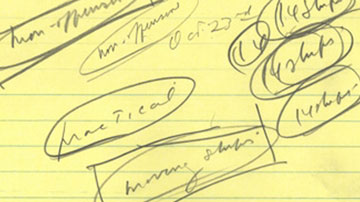Lessons of past presidents could help Trump beat covid-19 — if he listened
The president is missing a key opportunity to become a more effective leader
Read the full story at the Washington Post
In response to a reporter’s question, President Trump openly dismissed the idea that consulting his predecessors might be useful in developing a national response to the covid-19 crisis. “I think we’re doing an incredible job,” Trump replied, evidently seeing any search for assistance as a confession of weakness. “I don’t think I’m going to learn much [from reaching out] and, you know, I guess you could say that there’s probably a natural inclination not to call.”
That’s a very different approach than John F. Kennedy took on Oct. 26, 1962, during the depths of the Cuban missile crisis, when he telephoned his predecessor, Dwight Eisenhower. Kennedy wanted to hear the general’s thinking about whether the Soviet Union would start a nuclear war if Kennedy executed plans to invade Cuba to remove the missiles. Kennedy’s call afforded him the insights of a man with unparalleled experience in the intricacies of U.S.-Soviet military relations, albeit a member of the opposition party. And at a time of excruciating pressure, the call enabled Kennedy to be certain that he had done everything humanly possible to make the right decisions in a life-or-death situation.
To borrow a phrase from the 1988 presidential campaign, Donald Trump is no Jack Kennedy. In dismissing the insights and examples of former presidents, Trump is missing a key opportunity to become a more effective leader during a time of crisis.
Consider what President Trump could learn from those who most recently preceded him in the office.
Jimmy Carter, the oldest living former president, was an engineer by training and brought precision and technical expertise to the presidency. He owned scientific problems and came down hard on his staff when they allowed politics to creep into their analysis of issues. He also believed that a president owed it to the American people to be direct with them: telling the nation, without sugarcoating it, the nature of the challenges confronting them and how much pain they would have to endure to get through them. Americans today would no doubt welcome hearing from the White House an informed, reliable and honest assessment of the difficult road ahead.
Ronald Reagan lacked Carter’s attention to detail, but the Great Communicator had an unmatched gift for finding upbeat language to motivate the nation in ways that caused even his political opposition to marvel. He helped the country endure hard days, such as those just after the 1986 Challenger explosion rocked the nation, with words of comfort and vision: “The future doesn’t belong to the fainthearted,” Reagan intoned after the loss of seven astronauts, “it belongs to the brave.”

